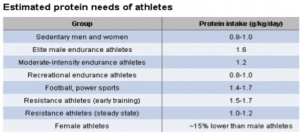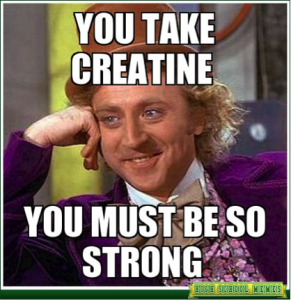In general, taking supplements are essential for building muscle and even for healthy living; however, I’m here to discuss when supplements are necessary, and when they’re not. Most people buy tons of supplements thinking that they can have an advantage with the supplements and build muscle quickly. To understand muscle hypertrophy and supplements in general, we first have to look at how muscle is built! In general, when one exercises, there are micro-tears that occur at the muscle fiber level (and tears that occur at a point even smaller than this level!). This microtearing requires some sort of repair, and growth to allow the tissue to become stronger. In order to repair the tear and grow, protein synthesis is required. This process is where one’s protein intake comes into place. In my last blog about nutrition, you will recall that a person performing a consistent resistance exercise routine requires 1-1.7 g/kg BM of protein a day. If I were meeting those requirements with my diet, I would not need to supplement with a protein shake after my exercise; I’m already meeting my body’s need for protein synthesis. If I’m at a shortage, then I will need to supplement with protein (most likely a whey protein drink).
Whey protein is most effective in stimulating muscle protein synthesis after exercise. This is because whey protein digests and is absorbed into the muscle very quickly. Many research articles state that there is no effect in ingesting 40 g of protein after exercise because that dose had little effect on protein synthesis. Instead, the recommended intake is between 20-25 g of protein after training.
Furthermore, protein synthesis costs the body energy (glucose or glycogen) and carbs are necessary to provide that energy necessary for muscle hypertrophy. As a result, recent research suggests that a carb + protein mixture is the best way to promote protein synthesis after exercise. As well, the same research also found that a carb + protein mix after exercise produced a positive hormonal environment for protein synthesis to occur, resulting in more efficient muscle hypertrophy.
Creatine
The idea behind creatine supplementation is based on the formulae listed above. Basically ATP is a necessary energy source for any muscle. Phosphocreatine (PCr) is required to create ATP. Because PCr is very difficult to synthesize and create as a product, supplement companies have looked past PCr and have been able to experiment with creatine. The basic idea is that they would supplement the creatine, which will be stored in the muscle and readily available to be converted to PCr. After which, this product would be converted back to ATP again. This process isn’t the most efficient, but is the only realistic process with today’s current science. Unless someone finds out how to create a PCr supplement, creatine supplements will always be commonly used.
The common misconceptions from this idea are that ingesting creatine would possibly increase muscle hypertrophy (meaning the person taking it would have greater muscle growth), and an increase in the time to fatigue in any type of exercise (meaning the person would be able to exercise for longer and recover faster), due to having creatine readily available in the muscle tissue for recovery.
Actual research states that there are increases in muscle stores of Cr, but fewer increases in PCr levels. Furthermore, there is a retention of total body water, thus increasing body mass of the person taking it. There was no sign of actual muscle hypertrophy (any increase in muscle was likely due to muscle fiber swelling due to an increase in muscle cell water). Interestingly enough, there were also some signs of an increased ability to exercise, albeit in just ATP dependent exercises, such as repeated sprints or strength exercises. Lastly, there was evidence that athletes with a good dietary protein intake will already have higher natural stores of Cr and PCr , thus will not respond well to Cr supplementation. In contrast, a vegetarian who wouldn’t eat as much protein would respond a lot better.
The downsides of chronically using creatine are possible stress on kidney & liver function and suppression of natural Cr/PCr kinetics in body. Recommended dosage = 2-5 g/day
Caffeine
The exercise effects of caffeine are plentiful: increase metabolic rate, reduced perception of getting tired quicker and increased mental sharpness. There is a lot of evidence that states caffeine is beneficial in endurance sports or team sports. Even more so, caffeine is effective for sports that are high intensity and last between 1-60 minutes (eg. distance running or swimming). In early research of caffeine, up to 6 mg/kg BM of caffeine taken within 1 hour before exercise was thought to be necessary in order to obtain the best effects of caffeine. However, recent evidence suggests that as little as approximately 3 mg/kg BM dosage of caffeine would provide a plateau effect (a limit on the effects of caffeine). With this lower dose, fewer side effects present and the person ingesting caffeine will also build less of a tolerance to it.
Diet pills
Because obesity is such an epidemic nowadays, people turn to these diet pills to find a quick way to lose weight. Most diet pills use chemicals with ingredients similar to crystal meth, diuretics, or thyroid hormones, in order to make the body work at a hyperactive state. The common belief is that these chemicals will boost your body’s natural metabolic rate in an effort to increase sweating and as a result lose weight, or more importantly fat. The reality is that your body will be working at a hyperactive state, however your liver will have a hard time getting rid of the toxic by products of the diet pill. These by products are used to even mask the negative side effects that you will eventually feel from taking the diet pill! So in essence, you would be taking the drugs on top of even more drugs if you were taking a diet pill. This tactic is very problematic and even unethical in the highest sense. Such by products can be found in the table I’ve provided from a research article below.
Furthermore, some of these pills aren’t even approved by country’s food and drug administration board, and appear on store shelves. As a result, this issue emphasizes the importance of doing research on a product and reading labels before you buy them!
Will’s picks
These are some of the supplements that I have used in the past, and have found good results in doing so!
1) BSN True Mass (a good carb + protein mixture that provides great nutritional balance for a good post workout routine)
2) Muscle Pharm Combat Whey Protein (a good whey protein supplement that is relatively cheap for how much powder you buy)
Will Le BScKin Student
References:
Credits to Dr. Vicki Harber & Gordon Bell for their supplement notes
Cohen, P.A., Goday, A. & Swann, J.P. (2012). The return of the rainbow pill. American Journal of Public Health 102 (9): 1677-1683.




